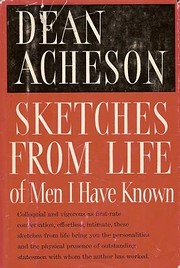

Cliquer sur une vignette pour aller sur Google Books.
|
Chargement... Sketches from life of men I have knownpar Dean Acheson
 Aucun Actuellement, il n'y a pas de discussions au sujet de ce livre. aucune critique | ajouter une critique
Distinctions
Aucune description trouvée dans une bibliothèque |
Discussion en coursAucun
 Google Books — Chargement... Google Books — Chargement...GenresClassification décimale de Melvil (CDD)940.5History and Geography Europe Europe 1918-Classification de la Bibliothèque du CongrèsÉvaluationMoyenne: (3.5) (3.5)
Est-ce vous ?Devenez un(e) auteur LibraryThing. |
|||||||||||||||||||||||||||||||||||||||||||||||||||||||||||||||||||||||||||||||||||||||||||||||||||||||||
This book contains a series of reminiscences/portraits of the diplomats and politicians he worked with (or, in some cases, against) and/or under during his time in the diplomatic corps. The book opens with chapters about Ernest Bevin and Robert Shuman, Acheson's opposite numbers for England and France, respectively, during the years at the end of, and immediately after, the war, when the large Western democracies were figuring out how they wanted to administer Western Europe and how to negotiate with Soviet Russia and create a united front against what they saw as Soviet plans for further expansion. There is a chapter, also, on Acheson's dealing with several Russian diplomats and their negotiating tactics. The chapters cover negotiations around the establishment of the United Nations, the administration of the post-war occupation of Germany and the establishment of the western alliance that became NATO. Of particular interest to me were the deliberations that led to the decision to bring West Germany into the alliance (i.e., to rearm them, a development that was viewed with some alarm, as I've learned from other reading, in many parts of Europe). While there was serious reluctance to take this step in some quarters, in the end the West Germans were seen by the U.S. and the Western European powers as a pivotal member of any alliance that would be able to stand up to Stalin and his successors. (